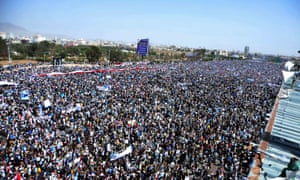
On the first anniversary of a war that has devastated Yemen, thousands demonstrated last weekend in the capital Sana’a to protest against the Saudi-led coalition that carries out daily air raids and has killed numerous civilians. Saudi Arabia and its allies launched their military intervention in Yemen in March 2015 with the objectives of both restoring the overthrown president Hadi and pushing Shia Houthi rebels out of the capital. One year on, neither of these goals have been attained.
That so many came out on to the streets in such a war-torn country said a lot about how desperate Yemenis have become. Their demonstration was a message to an outside world whose general response to Yemen is utter indifference. More than 2.4 million people have been forced out of their homes and 6,000 have been killed, half of them civilians. An estimated 80% of the population needs humanitarian assistance. Hundreds of thousands of Yemeni children face malnutrition, said Unicef yesterday. Food and electricity shortages are extreme – made worse by the blockade imposed on parts of the country by the Saudi coalition. Both sides have committed war crimes.
Yemen’s war has become a proxy in the Middle East’s overarching geopolitical rivalry between Iran and Saudi Arabia. Partly for this reason, it risks dragging on unless specific international action is taken. United Nations attempts to broker peace talks have produced little, with hopes now resting on a possible ceasefire on 10 April. Specific action must surely now involve pressure from the Saudi coalition’s international backers as well as restraint from Teheran.
For a year now, the US, Britain and France have continued to permit arms exports to the Saudis despite their numerous violations of the laws of war in Yemen. This policy makes these western countries complicit in some of the crimes being perpetrated, not least because they have done almost nothing to try to put an end to them. Nor have they put their support behind an independent international commission of inquiry that might be able to shed light on events and responsibilities. Calls from human rights organisations for an arms embargo on Saudi Arabia have been ignored. Since the UN is paralysed on the issue, surely this is somewhere where the EU should act, as the European parliament has already proposed. Yemen may seem remote and its war difficult to understand. But such an attitude does absolutely nothing to help its beleaguered inhabitants. The war in Yemen has attracted less global attention than other Middle Eastern conflicts, many of which have had a more direct impact on Europe. Yet turning a blind eye to what is happening in Yemen is neither possible nor sustainable, and not just because jihadi terrorist groups are increasingly getting a foothold there, benefiting from regional chaos in order to form a base for operations further afield, perhaps even extending into Europe.
In the end, the fact that several western governments are so deeply enmeshed in the war means the legacy will have to be shared too. The actions of western governments in propping up one side in the conflict with arms may not be the sole cause of a war that is essentially local and regional. But the impact of these western weapons and other forms of support cannot be ignored. Here is one western policy that can and should be swiftly changed before things get even worse.
No comments:
Post a Comment